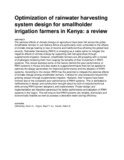Optimization of rainwater harvesting system design for smallholder irrigation farmers in Kenya: a review
Date
2021-04-15Author
Odhiambo, Kevin O
Ong'or, Basil T.Iro
Kanda, Edwin K
Metadata
Show full item recordAbstract
The adverse effects of climate change on agriculture have been felt across the globe. Smallholder farmers in sub-Sahara Africa are particularly more vulnerable to the effects of climate change leading to loss of income and livelihood thus affecting the global food security. Rainwater Harvesting (RWH) is emerging as a viable option to mitigate the negative effects of climate change by supporting rain-fed agriculture through supplemental irrigation. However, smallholder farmers are still grappling with a myriad of challenges hindering them from reaping the benefits of their investment in RWH systems. This review explores some of the factors behind the poor performance of RWH systems in Kenya and also seeks to suggest techniques that can be applied to optimize the design parameters for improved performance and the adoption of RWH systems. According to the review, RWH has the potential to mitigate the adverse effects of climate change among smallholder farmers. It allows for crop production beyond the growing season through supplemental irrigation. However, their impacts have been minimal due to the consistent poor performance of RWH systems. This is attributed to inefficiencies in design and construction brought about by lack of required technical skills among RWH system designers and implementers. Proper design and implementation are therefore paramount for better performance and adoption of RWH systems in the region. This will ensure that RWH systems are reliable, technically and economically feasible as well as possess a desirable water-saving efficiency.
URI
https://doi.org/10.2166/aqua.2021.087https://iwaponline.com/aqua/article/doi/10.2166/aqua.2021.087/81472/Optimization-of-rainwater-harvesting-system-design
http://ir-library.mmust.ac.ke/123456789/1519
Collections
- Journal Articles [411]

